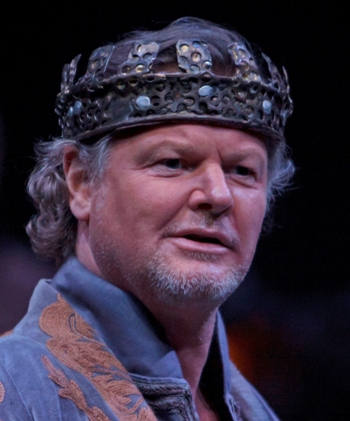
I sometimes think of director Antoni Cimolino as a mountain climber. He seems to prefer to tackle Mt. Everest-difficult plays instead of enjoying a stroll along the boardwalk like Harvey. Among his Stratford successes have been such tough assignments as The Grapes of Wrath, Bartholomew Fair, Coriolanus and King John. So right in the middle of Stratford’s festive opening week of their 60th anniversary season -- between Much Ado About Nothing, 42nd Street, You’re A Good Man, Charlie Brown, The Pirates of Penzance and The Matchmaker, would you believe that Mr. Cimolino gave us a first-rate Cymbeline ?
Even at Shakespeare festivals, Cymbeline doesn’t get produced much. A very late Shakespeare play, it seems to have a rush of Shakespeare’s ideas all crowding together to almost contradict one another in the sprawling plot. There is certainly much poetry, greatness and theatrical excitement in this play, but it is truly a mess if you want to follow or really believe it. History runs smack into sheer fantasy, serious political discussion gets sidetracked into magic and gross comedy, with unlikely disguises, sexual oddities, and even a startling appearance by Jupiter, the King of the Gods.
Geraint Wyn Davies, a great actor who can do anything, almost makes a consistent character out of Cymbeline, who begins an intolerant father, dismissing the supposedly “lowly-born” Posthumus, fiancé of Cymbeline’s daughter Imogen, to Italy, shifts attitudes throughout the play, and ends a wise and loving king. Of course, in Shakespeare “lowly born” means noble as all get-out, and Graham Abbey returns to Stratford to play this hero figure almost believably throughout (considering that Posthumus has to be a super-faithful husband – who bargains away his claim to his wife, a true Briton who becomes a Roman – then defies the Romans, asks to get killed, and struggles to survive after realizing that Imogen did not betray him, and that he does love her but doesn’t recognize her and punches her out). Abbey is really a wonderful actor and has the best chest of many exposed in this production. And Cara Ricketts deserves awards for playing Imogen so charmingly, because Imogen survives more perils than Pauline and maintains our concern while disguised as a boy, playing Goldilocks in the cabin of three bearlike men, two of whom turn out to be her long-lost brothers. Then she drinks poison and dies but actually doesn’t, and like that. Iachimo, the villain positioned against Posthumus [because his other enemies all come to love him] is a Roman roué who doesn’t really otherwise fit into the plot. But we see him make a wager on Imogen’s fidelity, come meet her and become enamored, and get rejected, and hide in her bedroom to frame her falsely for infidelity, and then become Posthumus’s prisoner when Posthumus becomes a Roman soldier instead of a Brit, and confesses his misdeeds for a happy ending. I think the role an unnecessary distraction, but suave, commanding Tom McCamus makes it a compelling small drama of its own.
Then there are the three bears: hairy woodsmen-types played by strong-voiced Robert King, and his two “sons,” played equally potently by John Vickery and E.B. Smith. They have too many character names to bother with here because they’re actually King Cymbeline’s long-lost sons, also thought to be dead, and also truly noble underneath their misleading surfaces.
Did I mention that Posthumus meets his dead family (headed by an impressive Andrew Gillies) in a dream-sequence? Well, never mind.
Nigel Bennett is a noble Roman Lucius. Peter Hutt, who plays the honest doctor who gives the evil queen a sedative to play with instead of the poison she asks for, is articulate as one of those stuck with long, historical background narratives to start this play confusingly.
About that evil Queen . . . Yanna McIntosh is sexy enough and strongly in charge enough to make the underwritten role of Cymbeline’s manipulative second wife believable. But one of this production's Most Valuable Players is Mike Shara as Cloten, her dull, mean-spirited son. Shara is an actor known to be inventive with comic, even slapstick touches to color the leading man roles he often is cast in; and he makes Cloten not only brutish and angry but often very funny in his awkward stupidity. That helps palliate the ugly scene where Cloten expects to destroy one of the peasants who then beheads Cloten. (The “peasant” is, however, actually a son of the king).
Somehow, armed with an impressively designed production, involving fights and mysterious group movement, subtle musical background, and Robert Thomson’s wonderfully varied and moody lighting, director Cimolino pulls all this carrying on into not only a dramatically involving performance, but also one that somehow – magic, history, melodrama, and endless confusing plot-shifts contributing – does seem to raise ideas about loyalties, received traditions, and enduring values that shape countries’ histories: the Roman rule of law that civilized the Britons, the evolving monarchy and populism of England after Elizabeth, and even the class struggles of our own troubled times. It’s more than I thought that one production of this hodge-podge play could achieve – much less unify so well.
